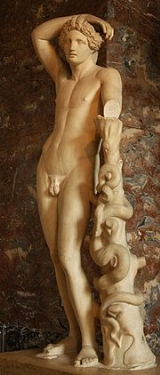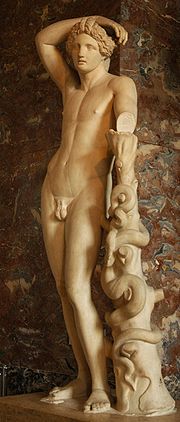
Letoon
Encyclopedia
The Letoon sometimes Latinized as Letoum, was a sanctuary of Leto
near the ancient city Xanthos
that was one of the most important religious centres of the Lycia
n region in Anatolia
. The site is located between the towns of Kaş
and Fethiye
in Antalya province
of Turkey
, approximately four km south of Xanthos along the Xanthos River.
Archaeological finds at the site, which was never a fully occupied settlement, but remained essentially a religious centre, date back to the late sixth century BCE, before the Greek cultural hegemony in Lycia, which began in the early fourth century. In earlier times, the site was probably already sacred to the cult of an earlier mother goddess— she is Eni Mahanahi in Lycia— which was superseded by the worship of Leto, joined by her twin offspring.
 In Greek mythology
In Greek mythology
, a claim for an early cult of Apollo in the valley of the Xanthus, unsupported by history or archaeology, was provided by two myths, each connected to an eponymous "Lycus
". One sprang from the autochthonous Telchines
of Rhodes and would have colonized the region at the time of Deucalion's flood; the other Lycus was an Athenian brother of Aegeus
driven from Athens, a seer who introduced the cult of Lycaean Apollo, which a folk etymology connected with Lycia and therefore made him its Athenian colonizer: see Lycus
.
The foundations of the Hellenistic temple dedicated to Leto
, and her children, Artemis
and Apollo
, have been excavated under the direction of H. Metzger from 1962. Archæologists have excavated much of the ruins; discoveries include the Letoon trilingual
, bearing inscriptions in Greek, Lycian and Aramaic, which has provided crucial keys in the deciphering of the Lycian language; it is conserved in the Fethiye Museum.
The sacrosanctity of the site is the purport of an anecdote related by Appian
concerning Mithridates
, who was planning to cut down the trees in the sacred grove
for his own purposes in his siege of the Lycian coastal city of Patara, but was warned against the sacrilegious action in a nightmare. The site remained active through the Roman period. The site was Christianised
by the construction of an early church, which reused cut stone from the sanctuary, but was abandoned from the seventh century CE.
Leto
In Greek mythology, Leto is a daughter of the Titans Coeus and Phoebe. The island of Kos is claimed as her birthplace. In the Olympian scheme, Zeus is the father of her twins, Apollo and Artemis, the Letoides, which Leto conceived after her hidden beauty accidentally caught the eyes of Zeus...
near the ancient city Xanthos
Xanthos
Xanthos was the name of a city in ancient Lycia, the site of present day Kınık, Antalya Province, Turkey, and of the river on which the city is situated...
that was one of the most important religious centres of the Lycia
Lycia
Lycia Lycian: Trm̃mis; ) was a region in Anatolia in what are now the provinces of Antalya and Muğla on the southern coast of Turkey. It was a federation of ancient cities in the region and later a province of the Roman Empire...
n region in Anatolia
Anatolia
Anatolia is a geographic and historical term denoting the westernmost protrusion of Asia, comprising the majority of the Republic of Turkey...
. The site is located between the towns of Kaş
Kas
Kas is the brand name of soft drink produced by PepsiCo. It comes in grapefruit, orange , lemon , bitter , and apple flavors. Kasfruit juices are also offered in multiple flavors...
and Fethiye
Fethiye
Fethiye is a city and district of Muğla Province in the Aegean region of Turkey with about 68,000 inhabitants .-History:...
in Antalya province
Antalya Province
Antalya Province is located on the Mediterranean coast of south-west Turkey, between the Taurus Mountains and the Mediterranean sea.Antalya Province is the centre of Turkey's tourism industry, attracting 30% of foreign tourists visiting Turkey. The province of Antalya corresponds to the lands of...
of Turkey
Turkey
Turkey , known officially as the Republic of Turkey , is a Eurasian country located in Western Asia and in East Thrace in Southeastern Europe...
, approximately four km south of Xanthos along the Xanthos River.
Archaeological finds at the site, which was never a fully occupied settlement, but remained essentially a religious centre, date back to the late sixth century BCE, before the Greek cultural hegemony in Lycia, which began in the early fourth century. In earlier times, the site was probably already sacred to the cult of an earlier mother goddess— she is Eni Mahanahi in Lycia— which was superseded by the worship of Leto, joined by her twin offspring.

Greek mythology
Greek mythology is the body of myths and legends belonging to the ancient Greeks, concerning their gods and heroes, the nature of the world, and the origins and significance of their own cult and ritual practices. They were a part of religion in ancient Greece...
, a claim for an early cult of Apollo in the valley of the Xanthus, unsupported by history or archaeology, was provided by two myths, each connected to an eponymous "Lycus
Lycus
Lycus or Lykos , a common name for Greek rivers, seems to have originated in the impression made upon the mind of the beholder by a torrent rushing down the side of a hill, which suggested the idea of a wolf rushing at its prey.Lycus or Lykos may refer to:* Lycus , several people in Greek...
". One sprang from the autochthonous Telchines
Telchines
In Greek mythology, the Telchines were the original inhabitants of the island of Rhodes, and were known in Crete and Cyprus....
of Rhodes and would have colonized the region at the time of Deucalion's flood; the other Lycus was an Athenian brother of Aegeus
Aegeus
In Greek mythology, Aegeus , also Aigeus, Aegeas or Aigeas , was an archaic figure in the founding myth of Athens. The "goat-man" who gave his name to the Aegean Sea was, next to Poseidon, the father of Theseus, the founder of Athenian institutions and one of the kings of Athens.-His reign:Upon the...
driven from Athens, a seer who introduced the cult of Lycaean Apollo, which a folk etymology connected with Lycia and therefore made him its Athenian colonizer: see Lycus
Lycus
Lycus or Lykos , a common name for Greek rivers, seems to have originated in the impression made upon the mind of the beholder by a torrent rushing down the side of a hill, which suggested the idea of a wolf rushing at its prey.Lycus or Lykos may refer to:* Lycus , several people in Greek...
.
The foundations of the Hellenistic temple dedicated to Leto
Leto
In Greek mythology, Leto is a daughter of the Titans Coeus and Phoebe. The island of Kos is claimed as her birthplace. In the Olympian scheme, Zeus is the father of her twins, Apollo and Artemis, the Letoides, which Leto conceived after her hidden beauty accidentally caught the eyes of Zeus...
, and her children, Artemis
Artemis
Artemis was one of the most widely venerated of the Ancient Greek deities. Her Roman equivalent is Diana. Some scholars believe that the name and indeed the goddess herself was originally pre-Greek. Homer refers to her as Artemis Agrotera, Potnia Theron: "Artemis of the wildland, Mistress of Animals"...
and Apollo
Apollo
Apollo is one of the most important and complex of the Olympian deities in Greek and Roman mythology...
, have been excavated under the direction of H. Metzger from 1962. Archæologists have excavated much of the ruins; discoveries include the Letoon trilingual
Letoon trilingual
The Letoon trilingual is an inscription in three languages: standard Lycian or Lycian A, Greek and Aramaic covering the faces of a four-sided stone stele called the Letoon Trilingual Stele, discovered in 1973 during the archeological exploration of the Letoon temple complex, near Xanthos, ancient...
, bearing inscriptions in Greek, Lycian and Aramaic, which has provided crucial keys in the deciphering of the Lycian language; it is conserved in the Fethiye Museum.
The sacrosanctity of the site is the purport of an anecdote related by Appian
Appian
Appian of Alexandria was a Roman historian of Greek ethnicity who flourished during the reigns of Trajan, Hadrian, and Antoninus Pius.He was born ca. 95 in Alexandria. He tells us that, after having filled the chief offices in the province of Egypt, he went to Rome ca. 120, where he practised as...
concerning Mithridates
Mithridates VI of Pontus
Mithridates VI or Mithradates VI Mithradates , from Old Persian Mithradatha, "gift of Mithra"; 134 BC – 63 BC, also known as Mithradates the Great and Eupator Dionysius, was king of Pontus and Armenia Minor in northern Anatolia from about 120 BC to 63 BC...
, who was planning to cut down the trees in the sacred grove
Sacred grove
A sacred grove is a grove of trees of special religious importance to a particular culture. Sacred groves were most prominent in the Ancient Near East and prehistoric Europe, but feature in various cultures throughout the world...
for his own purposes in his siege of the Lycian coastal city of Patara, but was warned against the sacrilegious action in a nightmare. The site remained active through the Roman period. The site was Christianised
Christianised sites
One aspect of Christianisation was the Christianisation of sites that had been pagan. In the 1st centuries of Christianity churches were either house churches in whatever houses were offered for use by their owners, or were shrines on the burial-sites of martyrs or saints, which following the usual...
by the construction of an early church, which reused cut stone from the sanctuary, but was abandoned from the seventh century CE.
External links
- The official website of the French Archaeological Mission of Xanthos-Letoon
- UNESCO World Heritage Centre: Xanthos-Letoon
- Canadian Epigraphic Mission at Xanthos-Letoon, website of the research project on Xanthos and Letoon by Université du Québec à MontréalUniversité du Québec à MontréalThe Université du Québec à Montréal is one of four universities in Montreal, Quebec, Canada.-Basic facts:The UQAM is the largest constituent element of the Université du Québec , a public university system with other branches in Gatineau , Rimouski, Rouyn-Noranda, Quebec City, Chicoutimi, and...
and Université LavalUniversité LavalLaval University is the oldest centre of education in Canada and was the first institution in North America to offer higher education in French...
, including downloadable published works - Extensive picture collection of Letoon

